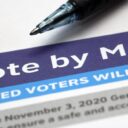

Sen. Bernie Sanders, I-Vt., hugs his wife Jane O’Meara Sanders, during the inaugural luncheon in honor of President Donald Trump at the Statuary Hall in the Capitol, Friday, Jan. 20, 2017, in Washington. (Photo: AP)
Bernie Sanders introduced a Medicare for all socialized healthcare bill, but most voters don’t even believe their getting what’s coming to them now.
A new Rasmussen Reports survey finds 52% of Likely U.S. Voters are at least Not Very Confident that the Medicare system will pay them all promised benefits in their lifetime, including 16% who are Not At All Confident. Forty-three percent (43%) are at least somewhat confident that the Medicare system will pay them all promised benefits in their lifetime, including 15% who are Very Confident.
The self-described socialist from Vermont lacked specifics about how much it would cost, how he would pay for it and how he would expand an already struggling services sector to ensure coverage. Americans are going to need those concerns addressed and not too many of them support Sen. Sanders’ likely proposal.
When asked how to keep Medicare solvent, only 33% overall support raising taxes, while an equal number say they would rather raise the eligibility age for future generations. Another 9% flat-out support cutting promised benefits. Overall, 42% support conservative proposals compared to 33% who support the traditional liberal solution–more government, more taxes.
Forty-two percent (425) of Democrats say they’d support raising taxes juxtaposed to just 23% of Republicans to 32% of unaffiliated voters. Forty-three percent (43%) of Republicans support raising the eligibility age, while 31% of Democrats and 24% of unaffiliated voters agree.
Unsurprisingly, voters 65 and older, who are eligible for Medicare, are much less likely to support (4%) cutting promised benefits and are more likely (41%) than younger voters to support raising the eligibility age for future generations. They are also the most likely to believe they’ll receive all their promised benefits.
Voters aged 40 to 64 are the least likely to say that raising the eligibility age is the best way to fix the system.
The survey of 1,000 Likely Voters was conducted on September 12-13, 2017, by Rasmussen Reports. The margin of sampling error is +/- 3 percentage points with a 95% level of confidence.







